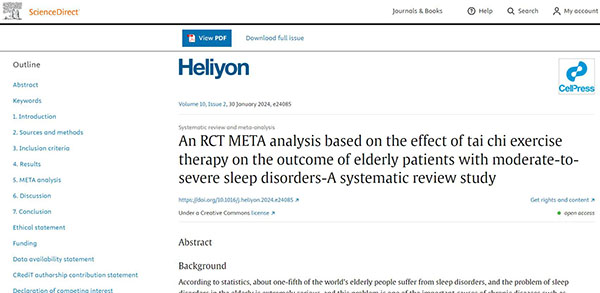
Insomnia is a common sleep disorder characterized by difficulty falling asleep, staying asleep, or having poor sleep quality. Insomnia can have significant negative effects on both an individual’s physical and mental health. Tai Chi is a traditional Chinese martial art whose soothing movements and deep breathing techniques have been shown to benefit a variety of health conditions.
How Tai Chi Works for Insomnia
The effects of Tai Chi on insomnia may be achieved through a variety of mechanisms, including:
Reducing anxiety and stress:
Tai Chi’s slow, deliberate movements can help reduce anxiety and stress, which are common triggers of insomnia.
Improving physical and mental relaxation:
Tai Chi emphasizes deep breathing and relaxation, which can help relax the body and mind in preparation for sleep.
Regulating the nervous system:
Tai Chi can improve sleep by regulating the autonomic nervous system, promoting relaxation and sleep.
Improving sleep hormone production: Studies have shown that Tai Chi can increase the secretion of melatonin, a hormone that helps with sleep.
Research evidence
Several studies have investigated the effects of Tai Chi on insomnia. A study published in the Journal of Neuroscience found that 12 weeks of Tai Chi training significantly improved sleep quality in people with insomnia, including faster time to fall asleep, improved sleep efficiency, and longer sleep duration.
Another study published in the Journal of Elder Care found that 8 weeks of Tai Chi training was as effective as medication in improving insomnia symptoms. Patients in the Tai Chi group reported improved sleep quality, longer sleep duration, and improved daytime function.
Specific Tai Chi Exercises
For insomnia, the following Tai Chi exercises are recommended:
Standing still with your feet shoulder-width apart, relax your body, and breathe deeply.
Eight-section Brocade: A traditional Tai Chi exercise that includes eight movements that improves Qi circulation and relaxation.
Twenty-four-posture Tai Chi: A slow, flowing form of Tai Chi that improves balance, coordination, and mental and physical relaxation.
Frequency and duration of practice
For the best results of Tai Chi for insomnia, it is recommended to practice 2-3 times per week for 30-60 minutes each time. Over time, as skills and endurance improve, the frequency and duration of practice can be gradually increased.
Precautions
Although Tai Chi is generally considered a safe activity, there are some precautions for some people. People with medical conditions or injuries should consult a healthcare provider before starting Tai Chi classes.
In addition, Tai Chi should not be used as a substitute for medication to treat insomnia. For persistent or severe insomnia, it is recommended to seek professional medical help.
Conclusion
Tai Chi is a traditional Chinese martial art that has the potential to improve insomnia and promote sleep. It works by reducing anxiety and stress, improving physical and mental relaxation, regulating the nervous system, and increasing the secretion of sleep hormones. Studies have shown that Tai Chi practice can significantly improve sleep quality in people with insomnia. For insomnia, it is recommended to practice Tai Chi 2-3 times a week for 30-60 minutes each time. Consistent practice over time can lead to lasting results. However, people with medical conditions or injuries should consult a healthcare provider before starting Tai Chi classes, and Tai Chi should not be used as a substitute for medication to treat insomnia.
